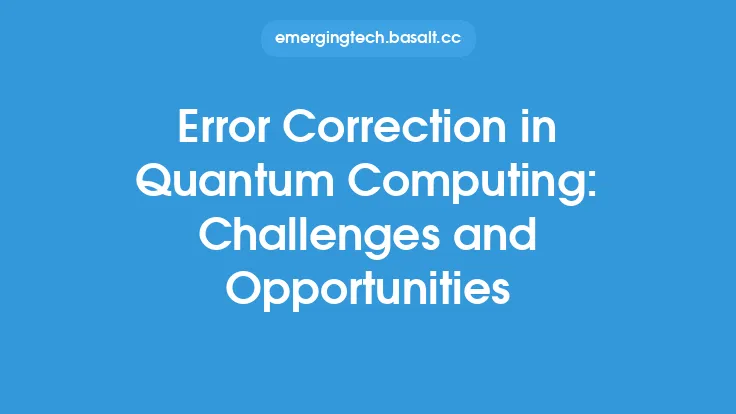Programming quantum computers is a complex and multidisciplinary field that requires a deep understanding of quantum mechanics, computer science, and software engineering. Quantum computers are designed to take advantage of the principles of quantum mechanics, such as superposition, entanglement, and interference, to perform calculations that are beyond the capabilities of classical computers. However, programming these devices is a challenging task due to the unique characteristics of quantum systems and the need for specialized software and hardware.
Introduction to Quantum Computing Concepts
To program a quantum computer, one needs to understand the basic concepts of quantum computing, including qubits, quantum gates, and quantum circuits. Qubits are the fundamental units of quantum information and are used to represent quantum states. Quantum gates are the quantum equivalent of logic gates in classical computing and are used to manipulate qubits. Quantum circuits are the sequences of quantum gates that are applied to qubits to perform a specific computation. Understanding these concepts is essential for programming quantum computers and developing quantum algorithms.
Quantum Algorithms and Programming Paradigms
Quantum algorithms are programs that run on quantum computers and are designed to solve specific problems. These algorithms can be classified into several categories, including quantum simulation, quantum search, and quantum optimization. Quantum simulation algorithms are used to simulate the behavior of quantum systems, while quantum search algorithms are used to find specific solutions to problems. Quantum optimization algorithms are used to find the optimal solution to a problem. Programming paradigms for quantum computers include the quantum circuit model, the topological quantum computer model, and the adiabatic quantum computer model. Each paradigm has its strengths and weaknesses, and the choice of paradigm depends on the specific problem being solved.
Challenges in Programming Quantum Computers
Programming quantum computers is a challenging task due to the unique characteristics of quantum systems. One of the main challenges is the need to manage and control the quantum states of qubits, which are prone to errors due to decoherence and noise. Decoherence is the loss of quantum coherence due to interactions with the environment, while noise is the random fluctuation of quantum states. Another challenge is the need to optimize quantum algorithms to minimize the number of quantum gates and reduce the computational time. Additionally, programming quantum computers requires a deep understanding of quantum mechanics and the ability to think in terms of quantum parallelism and entanglement.
Opportunities in Quantum Computing
Despite the challenges, programming quantum computers offers many opportunities for innovation and discovery. Quantum computers have the potential to solve complex problems that are beyond the capabilities of classical computers, such as simulating the behavior of molecules and optimizing complex systems. Quantum computers can also be used to break certain types of encryption algorithms, which has significant implications for cybersecurity. Furthermore, programming quantum computers can lead to new insights and discoveries in fields such as chemistry, materials science, and optimization. The development of quantum algorithms and programming techniques can also lead to new applications and industries, such as quantum simulation and quantum machine learning.
Quantum Error Correction and Noise Reduction
One of the main challenges in programming quantum computers is the need to manage and control errors due to decoherence and noise. Quantum error correction is a technique used to detect and correct errors in quantum states. This is achieved through the use of quantum error correction codes, such as the surface code and the Shor code. Noise reduction is another technique used to minimize the effects of noise on quantum states. This can be achieved through the use of noise reduction algorithms, such as dynamical decoupling and quantum error correction. Understanding quantum error correction and noise reduction is essential for programming quantum computers and developing reliable quantum algorithms.
Quantum Programming Languages and Software
Several programming languages and software frameworks have been developed to support the programming of quantum computers. These include Q# (Q Sharp), Qiskit, and Cirq. Q# is a programming language developed by Microsoft that is used to program quantum computers. Qiskit is an open-source software framework developed by IBM that provides a set of tools and libraries for programming quantum computers. Cirq is a software framework developed by Google that provides a set of tools and libraries for near-term quantum computing. Understanding these programming languages and software frameworks is essential for programming quantum computers and developing quantum algorithms.
Future Directions and Research Opportunities
The field of programming quantum computers is rapidly evolving, and there are many future directions and research opportunities. One of the main areas of research is the development of new quantum algorithms and programming techniques that can be used to solve complex problems. Another area of research is the development of new quantum programming languages and software frameworks that can support the programming of quantum computers. Additionally, there is a need for research in quantum error correction and noise reduction, as well as the development of new techniques for optimizing quantum algorithms. The development of quantum computing education and training programs is also essential for preparing the next generation of quantum programmers and researchers.
Conclusion
Programming quantum computers is a complex and multidisciplinary field that requires a deep understanding of quantum mechanics, computer science, and software engineering. Despite the challenges, programming quantum computers offers many opportunities for innovation and discovery. The development of new quantum algorithms, programming techniques, and software frameworks is essential for advancing the field of quantum computing. As research and development continue to advance, we can expect to see new breakthroughs and applications in fields such as chemistry, materials science, and optimization. The future of programming quantum computers is exciting and full of possibilities, and it will be interesting to see how this field evolves in the coming years.





